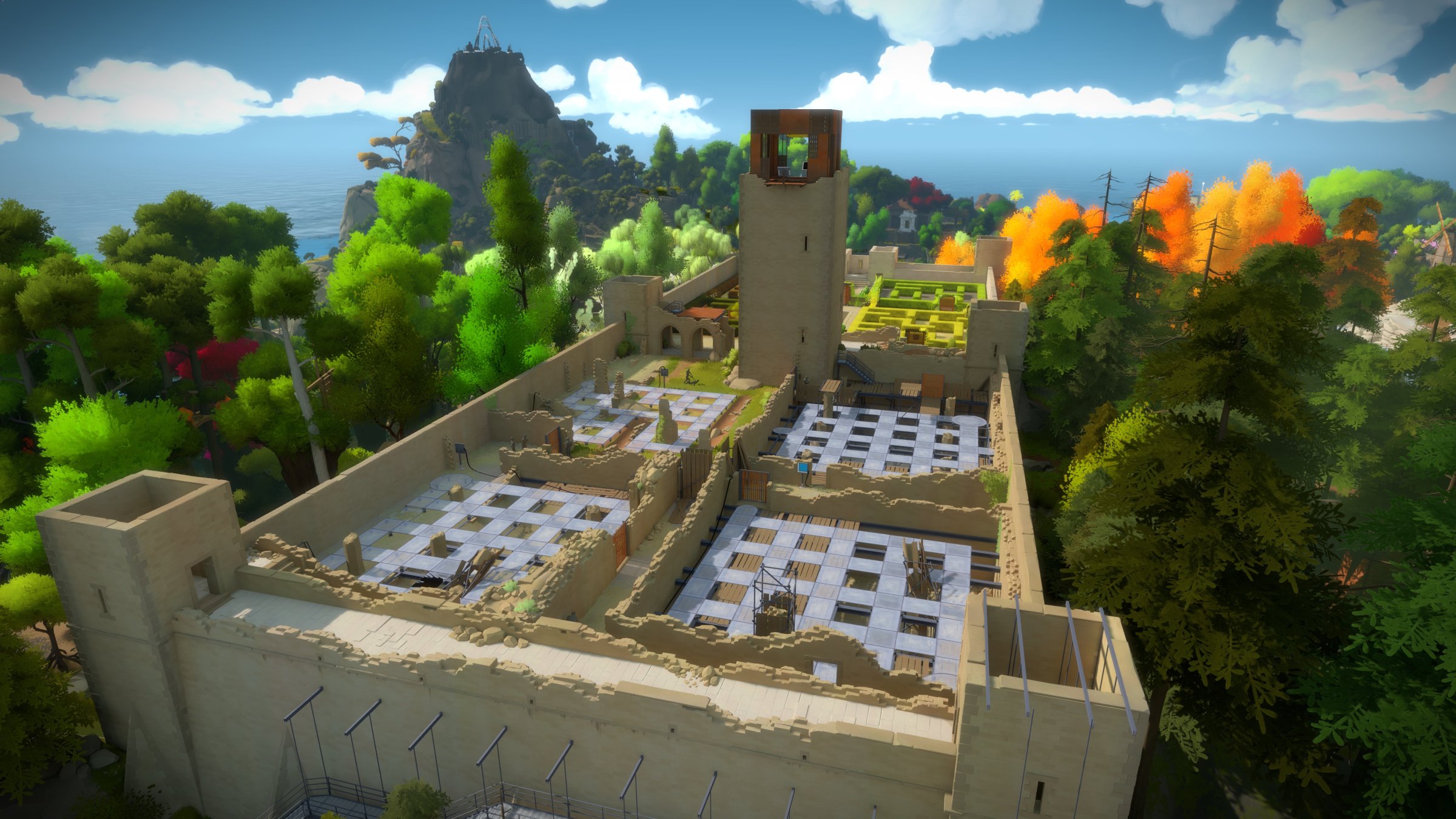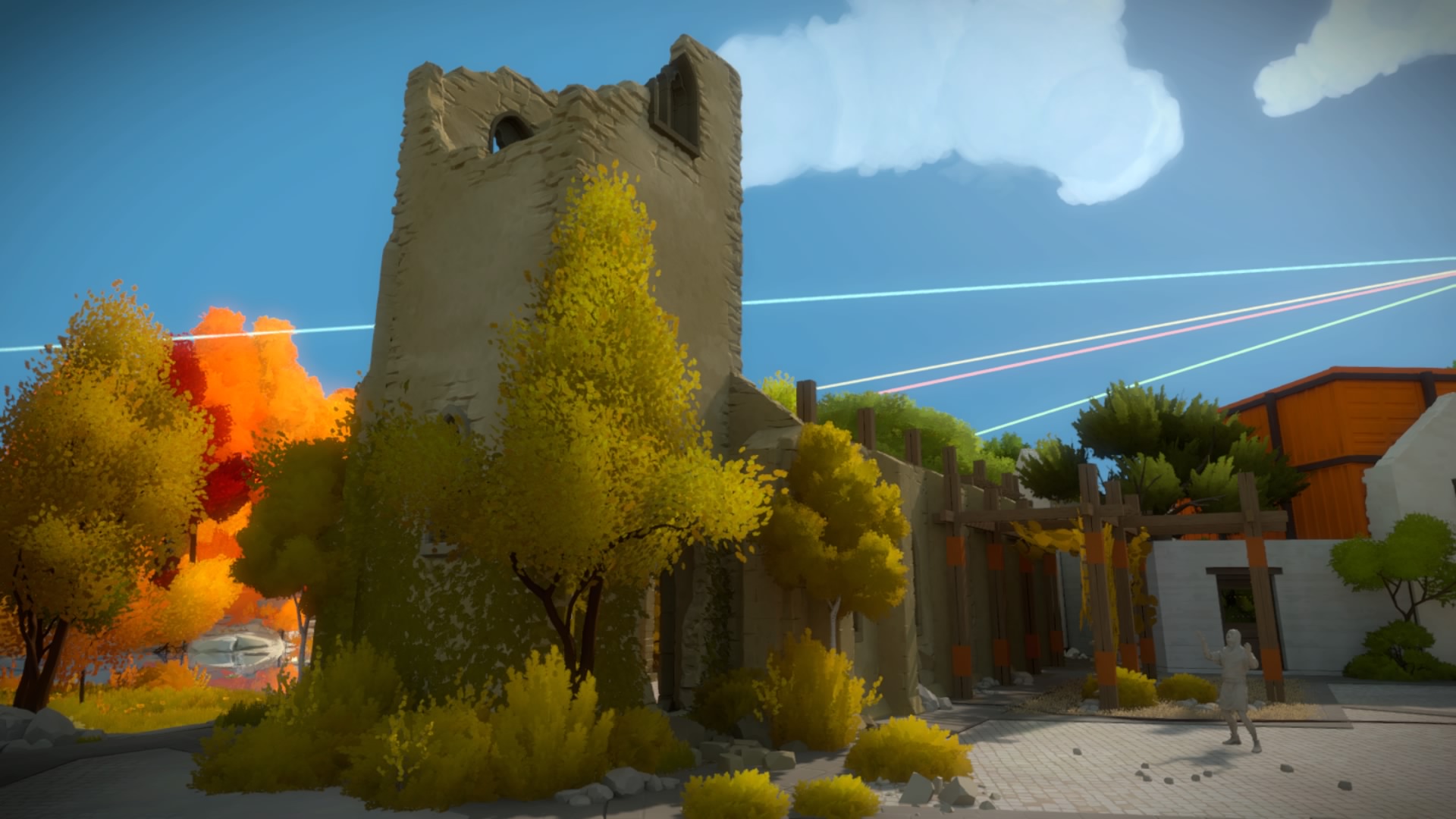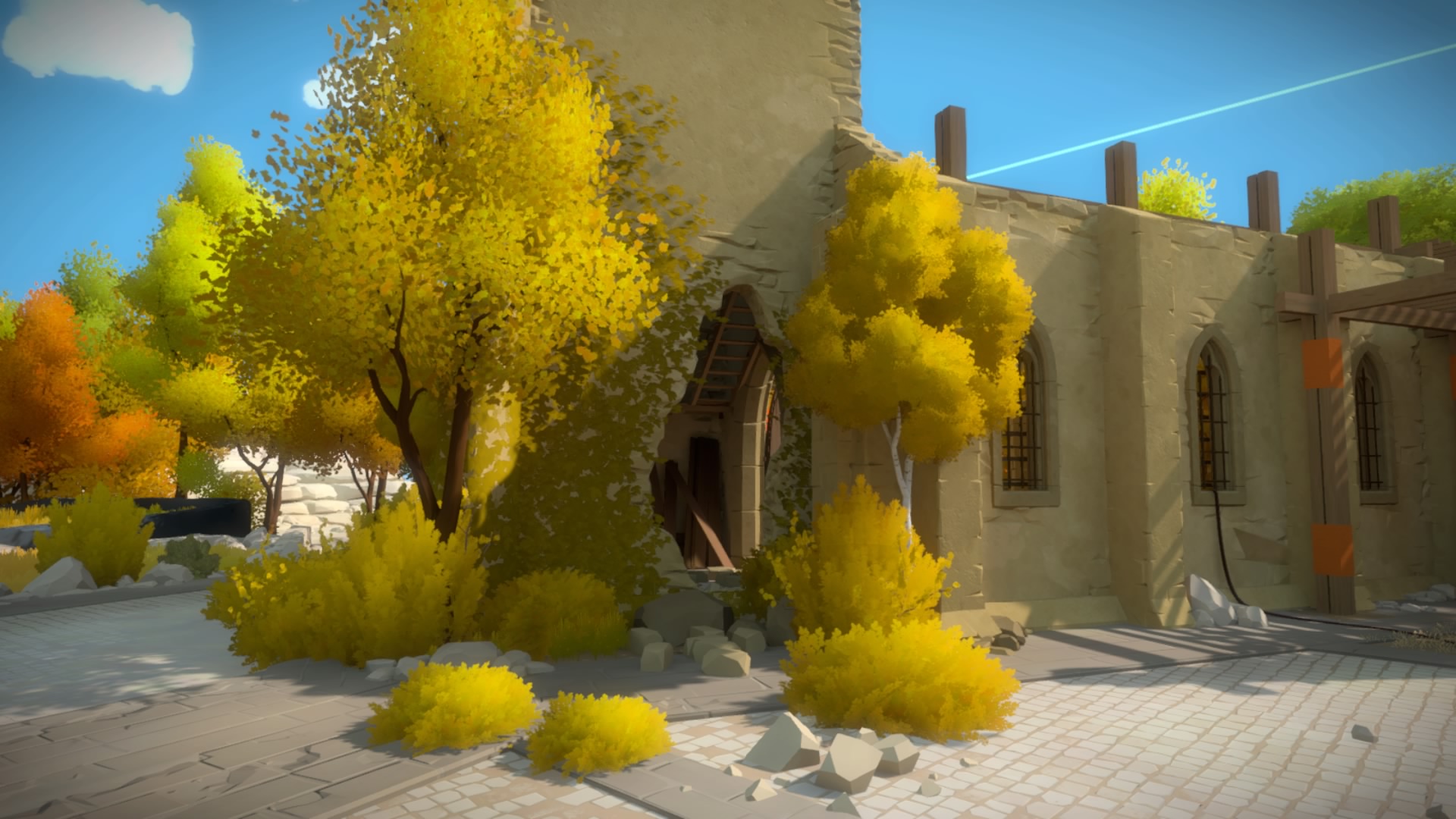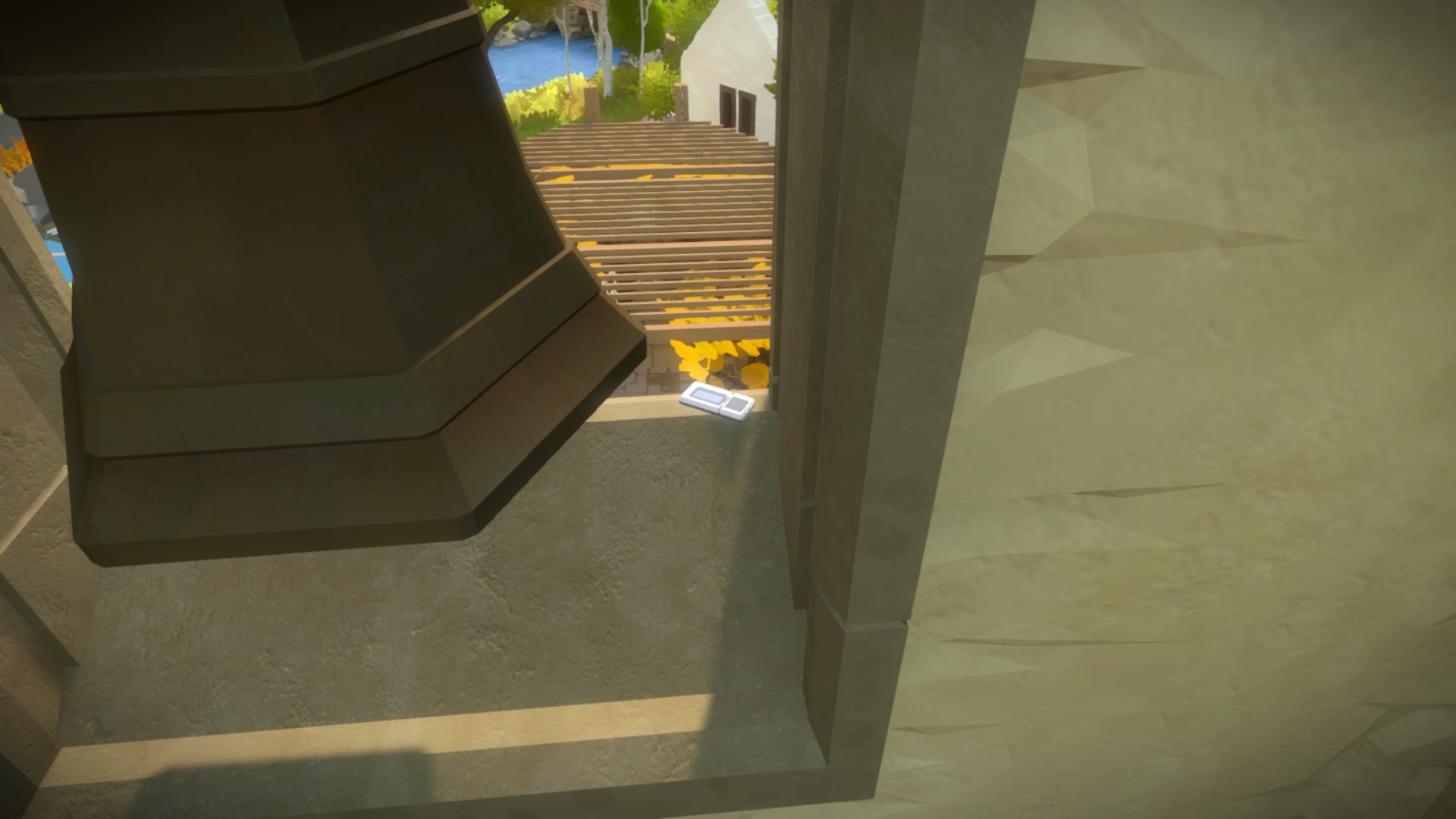
Before I do this, let’s get an obligatory spoiler alert warning out of the way. Do not, and I repeat do not, read what follows if you don’t want at least one aspect of The Witness potentially spoiled. To be clear: SPOILER ALERT. (If you’d rather just read my virtually-spoiler-free review, you can find that here.)
Okay, ready to forge on?
I say “potentially spoiled” as insurance against my own stupidity. “Really means” promises something I’m incapable of delivering in an objective capacity. I don’t know what most things “really mean,” nor do I presume to know the mind of The Witness director Jonathan Blow. And I’m probably asking for trouble by doing this, because Blow’s known for skewering theorists who’ve gone looking to excavate ideas from his other game, Braid. (A game he’s said he had specific ideas about while crafting, but that no one’s yet pieced together fully.)
That’s another subject worth getting into by the way: Blow’s refreshing aversion to flattering reviewers or writers trying to sound smart with lyrical hodgepodge. (But let’s save that for a later piece!)
For the moment, I want to talk about the game’s title, “The Witness,” and what I think it refers to. Because I found something in the game that led me to something else outside the game that I think speaks to it directly.
First, let me show you where I found it, in the sort of villa that occupies the near-center of the island. You’re looking for this chapel:

Walk to the side of the bell tower with the collapsed wall you can step through, then climb the circular stairs to the top.

Check out the windowsill to the right of the bell:

That’s an audio playback device, one of many strewn throughout the game. Some, like this one, are hidden in plain sight; others are tucked away in obscure areas or behind puzzle-locked doors. If you click this one, you’ll hear a voice reciting a quote that begins “Oh, my God, how does it happen in this poor old world, that Thou art so great and yet nobody finds Thee…”
Those words are found a few lines into a poem by Hans Denck, a 16th century German Reformation figure who had some interesting ideas about human spirituality. I dropped the quote into Google because I wasn’t familiar with Denck, and eventually stumbled on a book about him written by Rufus M. Jones titled Spiritual Reformers in the 16th and 17th Centuries.
Jones, writing about Denck’s belief that “The kingdom of God is in you and he who searches for it outside himself will never find it,” notes that:
This central insight of Denck’s religious faith that God and man are not completely sundered, but meet, he says, in the deeps of ourselves, is grounded upon the fact of experience that there is within us a supra-individual Reality which becomes revealed to us sometimes as Light, sometimes as a Word, sometimes as a Presence or environing Spirit. This testimony is Denck’s main contribution, and we must next see how he sets it forth.
Notice Jones’ contention that this is Denck’s “main contribution.” Here’s where I’ve either stumbled onto an enormous coincidence, or a central insight into the game’s title. Jones continues (my emphasis in bold):
There is, [Denck] says, a witness in every man. He who does not listen to it blinds himself, although God has given him originally a good inward eyesight. If a man will keep still and listen he will hear what the Spirit witnesses within him. Not only in us but in the heathen and in Jews this witness is given, and men might be preached to outwardly forever without perceiving, if they did not have the witness in their own hearts.
Looking past Jones’s prejudices, and reading his thoughts on Denck anachronistically, all you need do is twist a little to see the conventional Eastern angle: the idea that “seeing” or “hearing” involves a kind of quieting, a “being still” that may lead to insight or other forms of inner illumination. And there’s a lot of being still in The Witness.
I don’t think Blow’s showing us that Denck quote to advocate for religion in a literal sense, by the way. The Witness is littered with audiovisual information from secular and sacred conversationalists alike. It’s maybe trite to call it an “equal opportunity” game, but that’s essentially what it feels like, pulling in seemingly disparate ideologies, perhaps to illustrate both the possibilities for and limits of conceptual cross-pollination.
Blow brackets those apparently disparate ideologies with hundreds of puzzles that function as a kind of alt-language exercise in conveying objective information to players wordlessly. Think about the limits of human consciousness and bleeding edge physics ideas like M-theory (a candidate for unifying superstring theory) and the way the puzzles in The Witness work. I don’t want to slip into the sort of obscurantist babble Blow’s been rightly critical of, but given Blow’s stated interest in the disparity between what we think we know and what contemporary science seems to be telling us about the universe, I think there’s something profoundly ironic going on here.
You are of course literally witness to whatever happened on this island, and that’s important (think about the “observer effect”), and it seems repeatedly so. There’s an audio clip in an out-of-the-way part of the birth-like starter area, where—this much I’m also presuming—the female figure you play says “Through many births I have wandered on and on, searching for but never finding the builder of this house.” You appear to be caught in some sort of temporal loop, a notion at least one of the endgames appears to validate.
And that’s a good place to stop for now. I have nine beams up (of 11 total) as I’m typing this, a multihued cat’s cradle spreading across the sky. I’ve “finished” a central aspect of the game, but I don’t want to say more until I’ve activated the remaining beams as well as solved the hundreds of remaining puzzles (including inscribing all those symbols on the island’s weird black pylons). Blow told me that stuff sharpens the focus on some of the game’s bigger ideas.
And I could be dead wrong about any of this, or thinking about it too simplistically. Ghostly presence or no, the author is as alive in The Witness as the reader.
More Must-Reads from TIME
- Donald Trump Is TIME's 2024 Person of the Year
- Why We Chose Trump as Person of the Year
- Is Intermittent Fasting Good or Bad for You?
- The 100 Must-Read Books of 2024
- The 20 Best Christmas TV Episodes
- Column: If Optimism Feels Ridiculous Now, Try Hope
- The Future of Climate Action Is Trade Policy
- Merle Bombardieri Is Helping People Make the Baby Decision
Write to Matt Peckham at matt.peckham@time.com